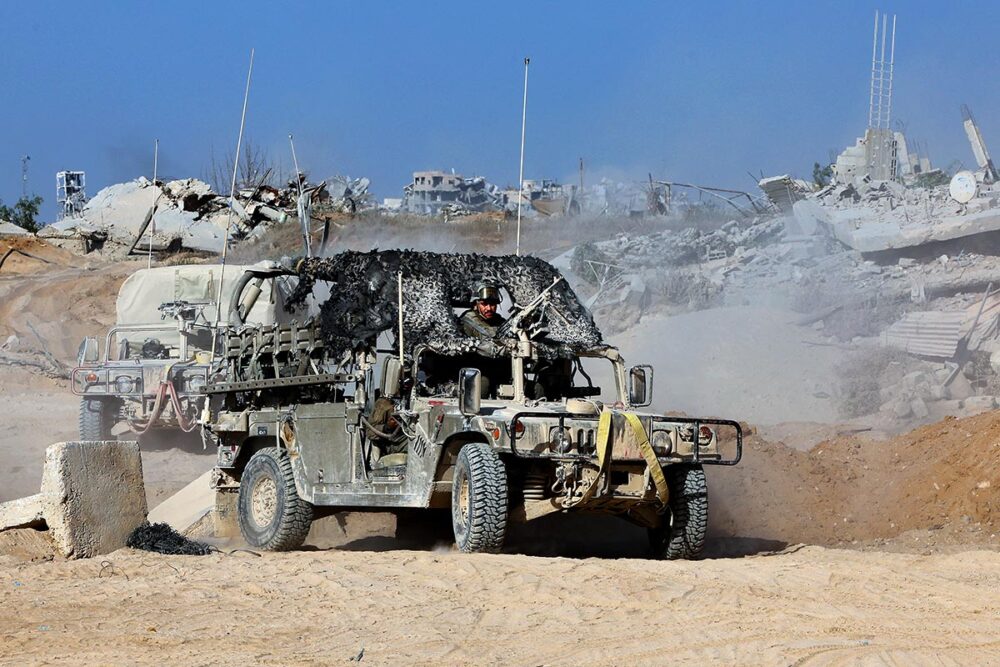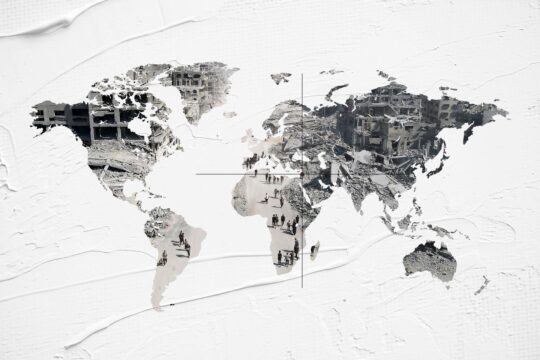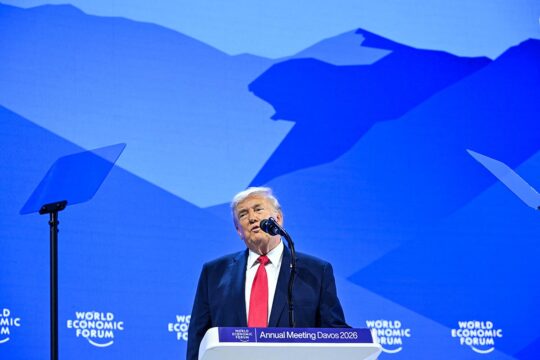October 2025 saw a glimmer of peace in the Middle East after a two-year war of unprecedented intensity in the contemporary history of Palestine, sparked by the October 7, 2023 Hamas attacks on Israeli territory. This was a war during which the word “genocide”, initially contested, took on more meaning each day as there were more and more reports and analyses pointing to evidence of abuses by the Israeli Defence Forces in the Gaza Strip: murders, mostly of civilians; blocking access to humanitarian aid and starvation of Gazans; forced displacement; destruction of essential infrastructure, schools, hospitals and other buildings protected by international humanitarian law.
Could peace wipe the slate clean for arms suppliers?
Following a referral by South Africa, the International Court of Justice (ICJ) issued orders as of January 2024 that Israel take a series of “provisional measures” to prevent acts falling under the 1948 Genocide Convention. It found that “there is urgency, in the sense that there is a real and imminent risk that irreparable prejudice will be caused to the rights found by the Court to be plausible”. The Court subsequently reaffirmed these measures, supporting them with two additional orders in March and May 2024. While the ICJ has not yet ruled on the merits of the case, an independent commission of inquiry mandated by the United Nations Human Rights Council published a report on September 16, 2025 in which it described Israel’s actions in Gaza as “genocide”.
These conclusions echo several other reports by Francesca Albanese, the UN Special Rapporteur on the situation in the Palestinian territories occupied since 1967, on what she describes as the “anatomy of a genocide” and the “economy of genocide”.
The prospect of peace, however fragile, does not erase the crimes committed by the various parties to the conflict. While the word “justice” is hard to make heard in this highly charged political context, those responsible for these crimes must be held accountable, whether they are direct perpetrators or those who provided them with assistance, particularly material assistance. This applies in particular to companies that have supplied military equipment, or equipment that could be used for such purposes and to commit acts falling under international criminal law.
The criminal prosecution of such indirect perpetrators, especially companies, for such crimes is not without its challenges. It is not enough to establish that these actors had commercial relations with the Israeli government or military partners. It is also necessary to establish a link between the equipment or services provided and the criminal acts. This raises questions related to the liability of legal entities (as such, and for the crime of genocide) and questions specific to the arms sector.
Arms companies and international crimes
This concept of responsibility is not new in international criminal law. It arose as early as the trials following the Second World War. The Nuremberg Charter did not envisage the liability of legal entities, the idea being that “it is men and not abstract entities who commit crimes”, but it did address the role of companies that provided material assistance to the Nazi regime in deporting and exterminating six million Jews, notably in the IG Farben trial. In July 1948, the Nuremberg Military Tribunal convicted several executives of the company that manufactured and supplied Zyklon B – essential for the operation of the gas chambers –, in particular for forced labour and enslavement, but not for their participation in the extermination itself.
Although the Statute of the International Criminal Court (ICC) does not provide for the prosecution of legal entities, company executives involved in the commission of international crimes falling within the Court’s jurisdiction could also be brought before it. In October, Italian civil society organizations sent a communication to the ICC Prosecutor asking him to open an investigation into Italian politicians and the head of an Italian aerospace and defence group for complicity in crimes committed in Gaza. They are accused of supplying the Israeli government with weapons used in the “ongoing genocide”.
Some national systems provide for the criminal liability of legal entities, including for international crimes. This is the case in France, where BNP-Paribas is being prosecuted for complicity in war crimes in Sudan. In October 2025, the company was ordered by a New York court to pay reparations to Sudanese refugees for financing Omar al-Bashir’s regime. The cement manufacturer Lafarge is also under investigation for financing terrorism and complicity in crimes against humanity linked to alleged support for the Islamic State group in Syria.
Intent at the heart of genocide
Different levels of intent are required for different international crimes. The level is particularly high for genocide, which requires both intent to commit the acts and intent to destroy one of the four groups protected by the Convention. This raises an initial question: how does this intent relate to the type of liability to be applied in proceedings against military equipment suppliers – mainly “complicity”, although other charges may be considered, such as “joint criminal enterprise” or “concealment of an international crime”? According to the case law of the International Criminal Tribunal for Rwanda, it is not necessary for the accomplice to share the perpetrator’s intent to commit genocide; it is sufficient that they were aware of it.
The second and main question in the context of alleged genocide in the Gaza Strip is at what point it can no longer be argued that one did not know or could not have known. It seems that the ICJ’s first order could constitute an objective time marker. Although the Court has not yet ruled on the merits of the case, it has issued a series of strong measures designed to prevent genocide, given the urgency of the situation and the “real and imminent risk of irreparable harm”. In its second order, however, the ICJ rejected the possibility of ordering third States to refrain from providing material assistance, particularly military assistance, to Israel. It considered that its Statute did not allow it to do so. Lack of jurisdiction does not, however, mean lack of obligation.
The UN Commission of Inquiry report notes that “since at least 26 January 2024, when the International Court of Justice ordered its first provisional measures, all States Parties to the Genocide Convention, and all other States too, have been on notice of a serious risk that genocide was being or would be committed. As such, the duty to prevent genocide was triggered due to the actual or constructive knowledge of the immediate plausibility that genocide was being or was about to be committed”.
In addition, most of the companies concerned by potential accusations of complicity in genocide in Gaza are, by their very nature, subject to state participation, sometimes majority participation, making this knowledge all the more inevitable.
Can companies hide behind State arms deals approvals?
Another challenge lies in the possibility that State responsibility could shield that of companies. The export of military equipment, or equipment that could be used for such purposes, is subject to regulations that require State authorizations. The Arms Trade Treaty stipulates that “a State Party shall not authorize any transfer of conventional arms (...) if it has knowledge at the time of authorization that the arms or items would be used in the commission of genocide, crimes against humanity, grave breaches of the Geneva Conventions of 1949, attacks directed against civilian objects or civilians protected as such, or other war crimes as defined by international agreements to which it is a Party”. There is a similar condition in European law.
While the principle seems strong, supranational levels of regulation leave States a wide margin of discretion. Thus, despite a call by UN experts to halt all arms exports to Israel, the United Kingdom in September 2025 still considered that the supply of parts necessary for the assembly of F-35 fighter jets, used by the Israeli army to bomb the Gaza Strip, was not likely to contribute to the commission of genocide or other violations of international humanitarian law.
The Netherlands has meanwhile adopted a different policy, under pressure from its courts prohibiting the export of F-35 equipment to Israel. However, the Dutch Supreme Court has reiterated the discretionary power of the government in relation to military equipment exports. French administrative justice declared that it did not have jurisdiction to review the legality of export licences, considering them to be acts of government. A similar ruling is being appealed in Germany in the context of another conflict, between Yemen and Saudi Arabia.
While the regulation of military equipment exports makes it difficult to establish State complicity in international crimes, State authorization does not eliminate the constituent elements of these crimes and complicity therein. Individuals or companies that carry out the export retain their free will and are therefore aware of the risks that their exports pose to a population. It is therefore difficult to see how State cover could shield them from criminal responsibility.
“Due diligence”
Company responses to press and civil society revelations about the use of European-supplied military equipment in Gaza reveal another way that they try to defend themselves, this time through their contracts. In line with State policies on equipment exports, contracts concluded while Israel’s war in Gaza was ongoing are said to stipulate that this equipment should under no circumstances be used in the context of that operation. In the same vein, the parts and equipment still being supplied are, according to these companies, intended exclusively for “non-lethal” equipment, such as surveillance drones – an argument quickly refuted by videos showing the massacre of civilians, including children, by these same drones.
These arguments echo the principle of due diligence, or duty of care, whereby a company must do everything in its power to prevent or mitigate human rights violations that its products or services could cause. Such obligations are supposed to be strengthened in the event of armed conflict, and one of the range of actions available to commercial actors is terminating commercial relations with actors likely to commit serious violations of international humanitarian law. Established at international level in non-binding instruments (by the UN and OECD), this principle is struggling to gain acceptance in national law.
Still few criminal complaints filed
To date, few criminal complaints have been filed against companies suspected of providing military aid to Israel. In France, the Human Rights League has filed a complaint against Eurolinks and IMI System for war crimes, crimes against humanity and genocide. Associations have also taken legal action against the Paris Air Show for “concealment and complicity in international crimes”, including the crime of genocide, for hosting – even whilst covering this up – Israeli companies at its last show.
Since the beginning of the war, the Israeli army has continually shown its technological and military dominance, and thereby the complicity of the international military industry through the supply of aircraft, drones, ammunition, training, technical components and other services that have enabled Israel to achieve the level of destruction seen in the Gaza Strip. The fact that this equipment was exported for civilian purposes, that all contractual provisions were met, that States authorized these exports, and that none of the directors explicitly embraced the genocidal ideology displayed by members of the Israeli government does not change anything: these companies did contribute to the commission of these crimes, and the documentation of this complicity is unprecedented.
It is high time for the criminal justice system to take up this evidence and, above all, to tackle the military industry’s responsibility for mass crimes. Prosecuting the “lords of war” is undoubtedly the only thing that would enable international crimes to be effectively prevented.

Damien Scalia is a professor of law at the Free University of Brussels (ULB) and a visiting professor (in international criminal law) at the University of Lausanne. For the past 15 years, he has been conducting research on the justice experience of individuals tried by international courts. He is co-director of the Maison des sciences humaines, ULB.

Elisa Novic is a researcher at the Centre for Criminal Law Research at the Free University of Brussels. She has worked as a lawyer for several non-governmental organisations on issues of transitional justice and the responsibility of multinationals for human rights and environmental violations. She holds a PhD in international law from the European University Institute.







